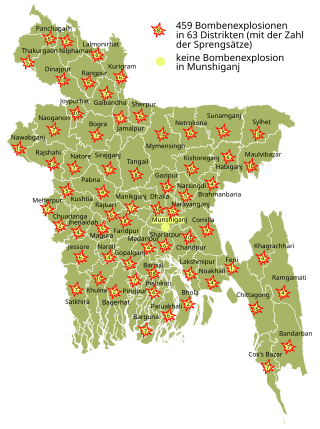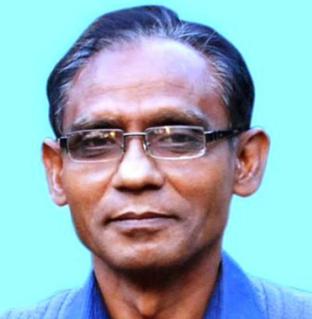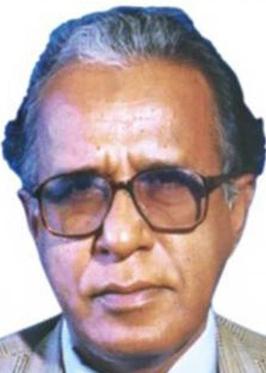Related Research Articles

Siddique ul-Islam, known popularly as Bangla Bhai, also known as Jawad uddin attariAzizur Rôhman, was a Bangladeshi terrorist and the military commander of the Al Qaeda affiliated radical Islamist organization Jagrata Muslim Janata Bangladesh, known in popular usage as the JMJB. Most active in the north-western section of Bangladesh around the Rajshahi region, Bangla Bhai gained a nationwide and worldwide notoriety for bombings and other terrorist activities.

The University of Rajshahi, also known as Rajshahi University or RU, is a public co-educational research university in Bangladesh situated near the northern Bangladeshi city of Rajshahi in a 305-hectare (753-acre) campus at Motihar, 3 kilometres (2 mi) East of the Rajshahi city center. It is the second largest, in terms of academic activities and campus area and also the second oldest, university in Bangladesh. The university's 60 departments are organized into ten faculties. It is considered one of the top research universities in Bangladesh. Researchers of this university have recently contributed a significant amount of effort and played a key role in bringing back medieval Bangladeshi Muslin fiber. It has a formidable alumnus base around Bangladesh and abroad. Because of its beautiful and well-planned verdurous campus, academic atmosphere and traditional inclination towards outdoor sports, it is popularly known as the Cambridge of the East.

Muhammad Shahidullah was a Bengali linguist, philologist, educationist, and writer.
On 17 August 2005, around 500 bomb explosions occurred at 300 locations in 63 out of the 64 districts of Bangladesh. The bombs exploded within a half-hour period starting from 11:30 am. A terrorist organization, Jama'atul Mujahideen Bangladesh (JMB) claimed responsibility for the bombings. The group, led by Shaykh Abdur Rahman and Siddiqur Rahman. Another terrorist group, named Harkat-ul-Jihad al-Islami, was associated with JMB in executing the co-ordinated attack. Following the bombings, both groups were banned by the BNP Government of Bangladesh.

Jamaat-ul-Mujahideen is a terrorist organisation operating in Bangladesh. It is listed as a terror group by Bangladesh, India, Malaysia and the United Kingdom. It was founded in April 1998 in Palampur in Dhaka Division by Abdur Rahman and gained public prominence in 2001 when bombs and documents detailing the activities of the organisation were discovered in Parbatipur in Dinajpur district. The organisation was officially declared a terrorist organisation and banned by the government of Bangladesh in February 2005 after attacks on NGOs. But it struck back in mid-August when it detonated 500 small bombs at 300 locations throughout Bangladesh. The group re-organised and has committed several public murders in 2016 in northern Bangladesh as part of a wave of attacks on secularists.

Ali Ahsan Mohammad Mojaheed was a Bangladeshi politician who served as a Member of Parliament and as the Minister of Social Welfare from 2001 to 2007. He was executed in 2015 for war crimes committed during the 1971 Liberation war of Bangladesh.

In 1971, the Pakistan Army and their local collaborators, most notably the extreme right wing militia group Al-Badr, engaged in the systematic execution of Bengali intellectuals during the Bangladesh Liberation War of 1971. Bengali intellectuals were abducted, tortured and killed during the entire duration of the war as part of the 1971 Bangladesh genocide. However, the largest number of systematic executions took place on 25 March and 14 December 1971, two dates that bookend the conflict. 14 December is commemorated in Bangladesh as Martyred Intellectuals Day.
Mohammed Mizanur Rahman is a British Islamist activist and former follower of Omar Bakri Muhammad. He has been described as a lecturer in Islamic jurisprudence, and in 2012 has written a 244-page book titled Are Demonstrations Beneficial? – In Light of The Qur'an and Sunnah, where he opposes demonstrations. He is of Bangladeshi descent. He was convicted in 2007 of charges of solicitation to murder American troops in Afghanistan and Iraq and sentenced to four years' imprisonment. He was released from prison in late 2010 and re-arrested for terror-related offences in September 2014.

Bangladesh Jamaat-e-Islami, previously known as Jamaat-e-Islami Bangladesh, or Jamaat for short, was the largest Islamist political party in Bangladesh. On 1 August 2013, the Bangladesh Supreme Court cancelled the registration of the Jamaat-e-Islami, ruling that the party is unfit to contest national elections.
Ashrafuz Zaman Khan is one of the convicted masterminds of 1971 killing of Bengali intellectuals. In 1971, he was a member of the Central Committee of the Islami Chhatra Sangha. After liberation he went to Pakistan and worked for Radio Pakistan. Later, he moved to New York and presently heads the Queens branch of Islamic Circle of North America (ICNA). He was sentenced to death in absentia by the International War Crimes Tribunal for killing 18 Bengali intellectuals during the last days of the 1971 Liberation War of Bangladesh.

Bangladesh has experienced terrorism in the past conducted by a number of different organizations. In the past, both ISIL and other terrorist organizations had claimed to be active in the country however, the Bangladeshi government believes that they mainly operated through local affiliates, before being neutralised by security forces.
Attacks by Islamist extremists in Bangladesh refers to a period of turbulence in Bangladesh between 2013 and 2016 where attacks on a number of secularist and atheist writers, bloggers, and publishers in Bangladesh; foreigners; homosexuals; and religious minorities such as Hindus, Buddhists, Christians and Shias were seen. By 2 July 2016 a total of 48 people, including 20 foreign nationals, were killed in such attacks. These attacks were largely blamed on extremist groups such as Ansarullah Bangla Team and Islamic State of Iraq and Syria. The Bangladeshi government was criticized for its response to the attacks, which included charging and jailing some of the secularist bloggers for allegedly defaming some religious groups; or hurting the religious sentiments of different religious groups; or urging the bloggers to flee overseas. This strategy was seen by some as pandering to hard line elements within Bangladesh's Muslim majority population. About 89% of the population in Bangladesh is Sunni Muslim. The government's eventual crackdown in June 2016 was also criticized for its heavy-handedness, as more than 11,000 people were arrested in a little more than a week.

A. F. M. Rezaul Karim Siddique was a professor of English at Rajshahi University, Bangladesh. He died in an attack suspected to have been carried out by Islamist militants that has been linked by commentators to a wave of attacks on secularists in Bangladesh.
2005 Jhalakathi bombing was a bombing of a car transporting judges to the District Court of Jhalakathi. Jama'atul Mujahideen Bangladesh (JMB) claimed responsibility for the bombings. The group, led by Shaykh Abdur Rahman and Siddiqur Rahman.

Aminul Haque was a Bangladesh Nationalist Party politician who served as the Bangladesh Minister of Post and Telecommunications. A member of the Bangladesh Nationalist Party (BNP), he represented Rajshahi-1 as a member of parliament from 1991 to 2006.
The 2005 Netrokona bombing was a suicide bomb attack on 8 December 2005 in Netrokona, Bangladesh that resulted in the deaths of eight people. It took place mid-morning outside the offices of Bangladesh Udichi Shilpigoshthi, a secular cultural organisation.
Islamic State – Bengal Province (IS-BP) is an administrative division of the Islamic State, a Salafi jihadist militant group and former unrecognised Quasi-state. The group was announced by ISIL as its province in 2016. The first emir of Wilayat al-Bengal, Abu Ibrahim al-Hanif, is believed to be Mohammad Saifullah Ozaki a Bangladeshi Japanese economist who went to Syria in 2015 and joined IS. A Hindu convert to Islam, he reportedly lead the 2016 Dhaka attack. He was detained in Iraq in 2019 and Abu Muhammed al-Bengali was announced as the new emir of the province.
Murder of S Taher Ahmed refers to the murder of S Taher Ahmed, a professor of the University of Rajshahi.
Murder of A. K. M. Shafiul Islam refers to the murder of University of Rajshahi professor A. K. M. Shafiul Islam. He was known to be a progressive and fan of lalon music. He was one of four teachers of the University killed in the last two decades.
Mohammad Anwar Latif Khan is a Bangladesh Army Colonel and the Sector Commander of Border Guards Bangladesh in Rajshahi. He is the former Additional Director General (Operations) at the Rapid Action Battalion (RAB) an elite multi-service unit of the Bangladesh Police and oversaw crackdowns on Islamist militants. He has been sanctioned by the United States for his activities in RAB. He had previously commanded RAB-5, RAB-7, and RAB-11.
References
- ↑ Atik, S.M.; Ali, Sujon. "4 RU teachers killed in 12yrs". New Age. Retrieved 9 July 2018.
- ↑ "Islamic State claims killing of Bangladeshi professor". ABC News. 23 April 2016. Retrieved 9 July 2018.
- ↑ "Enemy of none, lover of sitar". The Daily Star. 24 April 2016. Retrieved 9 July 2018.
- ↑ "Rajshahi University Professor Killed & a Former AL MP Injured". VOA (in Bengali). Retrieved 9 July 2018.
- ↑ "Professor Mohammad Yunus Killing: Shiksa Andolan Manch held Protest Rally". mm-gold.azureedge.net. Retrieved 9 July 2018.
- ↑ Ramsey, Syed (2017). Pakistan and Islamic Militancy in South Asia. Vij Books India Pvt Ltd. ISBN 9789386367433 . Retrieved 9 July 2018.
- 1 2 3 "Two killers of RU professor Mohammad Yunus get death sentence reduced to life term following retrial". bdnews24.com. Retrieved 9 July 2018.
- ↑ "Verdict in Prof Yunus murder case today". The Daily Star. 14 January 2010. Retrieved 9 July 2018.
- ↑ "Victims' families, colleagues blame probe failure". The Daily Star. 25 April 2016. Retrieved 9 July 2018.
- ↑ "Two JMB men's death commuted to life term". observerbd.com. Retrieved 9 July 2018.
- ↑ "RU prof yunus killing: Two JMB men's death sentence reduced to life-term". New Age. Retrieved 9 July 2018.